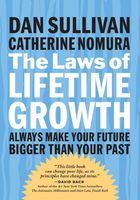
25
Law Three
Always Make Your Contribution
Bigger Than Your Reward
Increased contribution to others is essential for lifetime growth. As you become more successful, numerous rewards will come your way: greater income, praise, recognition, reputation, status, capabilities, resources, and opportunities. These are all desirable things, but they can be growth stoppers. They may tempt you to become fixated on just the rewards, rather than focus on making still greater contributions. The one way to guarantee that rewards will continually increase is to not think too much about them. Instead, continue making an even more significant contribution—by helping others to eliminate their dangers, capture their opportunities, and maximize their strengths. Greater rewards will automatically result from this, and your future will continue to be filled with increasingly rewarding ways to contribute. Always focus on creating new kinds of value for larger numbers of people, and you will ensure that your contribution is always greater than your reward.
Making a contribution for its own sake solidifies and expands your relationship with the outside world. It is through this relationship that your continual growth will be funded and supported. If you’re not making a contribution to others, it’s easy to get caught up in your own thoughts and go around in circles. By focusing on contributing and letting the rewards take care of themselves, you anchor yourself in the real world. Through the insight and feedback you get from others, you grow your understanding of how to create greater and greater value.
26
Putting Value Creation First
One of the most striking things about Mary Anne Ehlert is that, even as a top agent at one of the biggest financial-services companies in the United States, she never paid attention to how much her commission would be on any product she sold. In fact, she set up her business in such a way that she wouldn’t know, so that the only factor influencing her decision about what to sell a client would be whether or not it was the best available product to meet that client’s needs.
When Lisa Pijuan-Nomura, an artist and successful arts programmer in Toronto, puts on a show, she never thinks about what the take at the door is going to be or how the event will pay for itself. She focuses all her attention on trying to put on the best show and trusts that if it’s good, people will come. And because she produces quality consistently, people do come. She has never lost money on any show she’s produced.
27
The way in which Lisa and Mary Anne approach rewards is not a blind leap of faith; rather, it’s good business practice, and good practice in any area of life where you want to grow. When you focus on making a real contribution and allow your audience to decide how it will repay you, the rewards can often be greater than you might have imagined. Focusing on the rewards is a trap because it diverts your creative energy from what generates the rewards in the first place: the value that your audience gets from what you do.